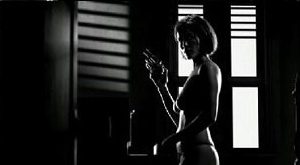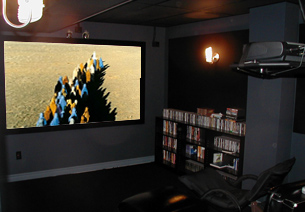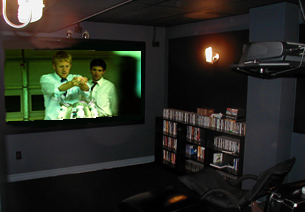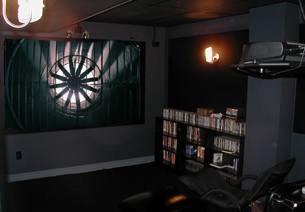
This is not so much a review (go to
Rotten Tomatoes, you can find many of the film, but I recommend
these two), as a reaction to much of the hoopla beginning to appear on websites, blogs and forums. Much like Pulp Fiction and Fight Club, Sin City appears to polarize film-goers of all kinds.
It appears that people have hang-ups on
A) Not enough story continuity (i.e. things just don't make sense)
B) Lack of subtext, relevence, maturity
C) Too much violence
I'm not trying to tell people what they should like or dislike, but rather clarify that a meta-film like Sin City succeeds on the level of 'style is substance' by magnifying its source material. That is, the nihilism of film noir, to the point of where images and moods
are the story (I mean what does a comic/graphic novel do better? and that is what Sin City is trying to faithfully reproduce). If you check narrative convention at the door and go for the mood of the piece, (redemption through revenge...at any cost) I think Sin City is a true winner: its creativity and energy are nearly limitless and the actors willingness to 'look goofy' for that sake of delivering intentionally hard-boiled dialogue which is 50 years out of date, (and really never existed in the first place except in pulp novels and B-level films) but certainly relevant as post-modern artistic expression) is to be commended. [ed. note: I apologize for the structure of that last run-on sentence!]
Obviously, if you go into a movie called 'Sin City' with puritan expectations of PG-13 bloodless violence and no nudity you are going to be disappointed. My point here is that the extreme violence is a part of the texture of the film, and to remove it would be to destroy the film. It's not real, it's hyper-real.
Lastly, (at the risk of sounding like a snob) people who do not get 'Sin City' probably have no frame of reference coming into the film: they are not familiar with the source material or are not in any way familiar with the film noir of the 1940's and early 1950s. While full knowledge of either graphic novels in general or the noir-genre is not necessary, passing familiarity will greatly enhance the experience. To put it another way, if you are just learning english, it's perhaps not advisable to pick up a James Joyce novel and expect to understand it. (On second thought a better way of saying this is perhaps you won't enjoy watching the Wayan Brothers' "SCARY MOVIE" if you haven't seen SCREAM, THE BLAIR WITCH PROJECT or those "Whaaaas up!" Budweiser commercials).
For those willing to write this movie off as the worst movie they've ever seen, I suggest you watch some more movies...(Start with Mystery Science Theatre 3000 episodes, and you will see how truly awful films can be).
For what Sin City sets out to accomplish...a no-holds-barred hyper-noir film representation of a graphic novel with cool characters and nihilistic hard-boiled performances from an ensemble of high-profile actors...It gets an A+ in my book and will likely be not only one of the best motion pictures this year, but also be one of the most emulated for the next several years...
This is a leap forward from the well intentioned attempts of Ang Lee's
Hulk to emulate the comic-book frame. This is the next level of the comic-book adaptation. Like it or not.
Postscript: I have an itching feeling that Sin City is gender-biasing...That is not to say that all guys will like it and all women hate it, but if you do the math, more guys will like it than gals. The entire films perspective is from the male characters, and fetishizing of violence is the realm of young males. The movie is not about relationships that connect the men to the women, it's about one person (guy) versus society/the-system/the-enemy. It's not surprising that most of those of female persuasion that I've spoken to about the film were not big fans. On a (positive) personal note though, my wife loved it...(and I love her for loving it!)




